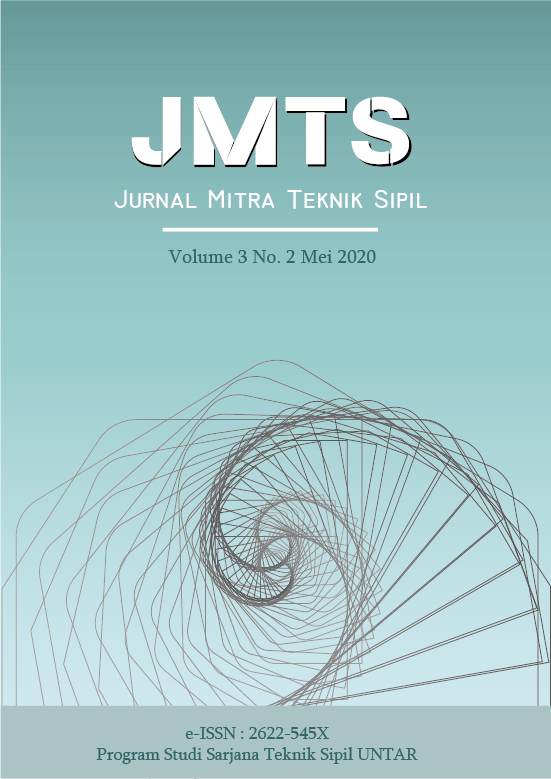PREDIKSI DURASI BERBASIS EARNED SCHEDULE MENGGUNAKAN FAKTOR PENGARUH INTERNAL DAN EKSTERNAL SERTA VARIABEL DUMMY
Main Article Content
Abstract
ABSTRACT
The success of a construction project could be seen based on whether the project has met the predetermined quality requirements, within a set budget and within the scheduled time duration. Time becomes one of the important aspects in planning a construction project because delay in the project can trigger various problems. Therefore, development of duration prediction technique could be a reliable option to increase prediction accuracy. The purpose of this study is to determine the relationship between the results of the duration estimation using earned schedule method with internal influence factors such as the number and gross floor area, external influence factors such as index of education, technology absorption, labor experience, technology availability, and innovation, and building type as dummy variable in predicting the total duration. The feasibility analysis showed that the equation of duration prediction using earned schedule method with internal and external influence factors as well as the dummy variable gave R2 value of 0.784 which means that the independent variables used could well explain the prediction of duration. There is an increase in the results of the coefficient of determination by 2.75% in the regression analysis using building type as dummy variable.
ABSTRAK
Keberhasilan suatu proyek konstruksi dapat dilihat berdasarkan ketepatan waktu yang telah dijadwalkan, ketepatan biaya yang telah dianggarkan, serta ketepatan mutu yang telah ditentukan sebelumnya. Waktu menjadi salah satu aspek penting dalam perencanaan suatu proyek konstruksi dikarenakan keterlambatan dalam proyek dapat memicu berbagai masalah baik dalam segi ekonomi maupun hukum, sehingga pengembangan suatu metode prediksi durasi dapat menjadi pilihan untuk meningkatkan akurasi prediksi. Tujuan dari penelitian ini adalah untuk mengetahui hubungan antara hasil prediksi durasi menggunakan metode Earned Schedule dengan faktor pengaruh internal berupa jumlah dan luas lantai, faktor pengaruh eksternal berupa indeks pendidikan, penyerapan teknologi, pengalaman tenaga kerja, ketersediaan teknologi, dan inovasi, serta variabel dummy berupa tipe bangunan dalam prediksi durasi total proyek pembangunan gedung bertingkat tinggi di Jakarta. Analisa dilakukan dengan menghitung estimasi durasi berdasarkan metode earned schedule yang menggunakan schedule performance index (SPI) dengan indikator waktu. Hasil analisa uji kelayakan regresi linier berganda menunjukkan bahwa persamaan prediksi durasi dengan faktor pengaruh internal dan eksternal serta variabel dummy memberikan nilai R2 sebesar 0.784 yang artinya variabel bebas yang digunakan dapat menjelaskan prediksi durasi dengan baik. Terdapat peningkatan hasil koefisien determinasi pada analisis regresi dengan menggunakan variabel dummy berupa tipe bangunan yaitu sebesar 2.75% dari nilai tanpa penggunaan variabel dummy.
Article Details
References
Anondho, B. Pengembangan Model Prediksi Durasi Probabilistik Proyek Pembangunan Gedung Bertingkat Tinggi Berbasis Faktor Pengaruh Eksternal Terukur. Universitas Indonesia, Depok, Indonesia, Disertasi Tidak Diterbitkan. 2018.
Bromilow, F.J. “Contract Time Performance Expectations and the Reality.” Building Forum, 1(3), 1969, 70-80.
Chan, A.P.C. “Modelling building durations in Hong Kong”. Journal of Construction Management and Economics, Routledge, 17:2, 1999, 189-196, DOI: 10.1080/014461999371682.
Khamooshi, H. and Abdi, A. “Project duration forecasting using earned duration management with exponential smoothing technique”. Journal of Management in Engineering, ASCE, 33(1), 2016, 1-10.
Lee, H., Shin, J., Park, M. & Ryu, Han. “Probabilistic Duration Estimation Model for High-Rise Structural Work”. Journal of Construction Engineering and Management, ASCE, 135, 2009, 1289-1298.
Lipke, W. “Earned schedule contribution to project management”. PM World Journal, 1(2), 2012.
Lipke, W. “Introduction to earned schedule second edition”. PM World Journal, 3(11), 2014.
Lipke, W., Zwikael, O., Henderson, K., and Anbari, F. “Prediction of project outcome: The application of statistical methods to earned value management and earned schedule performance indexes”. International Journal of Project Management, 27 (4), 2009, 400-407.
Love, P. E. D., Tse, R.Y.C. and Edwards, D.J. “Time-Cost Relationships in Australian Building Construction Projects”. Journal of Construction Engineering and Management, ASCE, 131(2), 2005, 187-94.
Ogunsemi, D. R. & Jagboro, G. O. “Time?cost model for building projects in Nigeria”. Journal of Construction Management and Economics, Routledge, 24(3), 2006, 253-258.
Project Management Institute. A Guide to The Project Management Body of Knowledge (PMBOK ® Guide) sixth edition. Four Campus Boulevard, Newtown Square, PA 19073-3299 USA, 2017.
Sousa, V., Almeida, N. M. and Dias, L. A. “Role of Statistics and Engineering Judgment in Developing Optimized Time-Cost Relationship Models”. Journal of Construction Engineering and Management, 140, 2014, 10.1061/(ASCE)CO.1943-7862.0000874.


